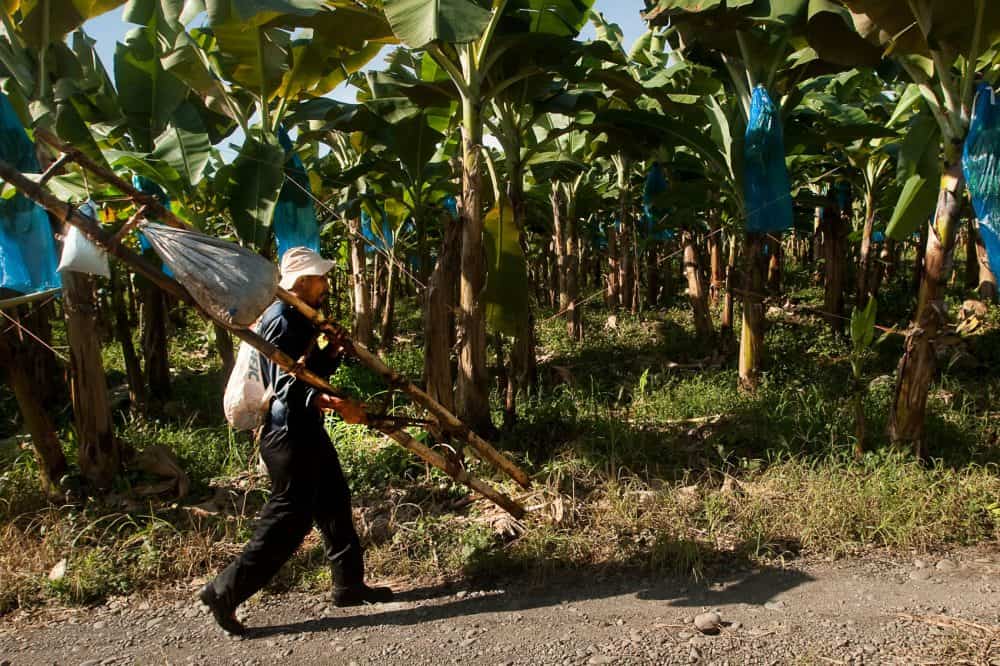 |
| For illustrative purposes. Ronald Reyes Sevilla/The Tico Times |
A “green” banana never looked so good. Costa Rica’s Environment Ministry (MINAE) recognized Finca San Pablo as the country’s first carbon neutral banana farm during a ceremony Monday.
Finca San Pablo’s general manager, Geraldo Mora, told The Tico Times that the company wanted to go carbon neutral to help the environment and serve as an example for other firms in the country’s important banana sector. The Siquierres-based company is a medium-sized operation, exporting 730,000 18-kilogram boxes of bananas annually, Mora said. Costa Rica is one of the world’s largest banana exporters. The country shipped off more than $900 million worth of the fruit in 2014, according to figures from the Foreign Trade Promotion Office.
Mora said Finca San Pablo shrunk its carbon footprint mainly by reducing its use of nitrogen-based fertilizers in favor of natural ones; reducing electricity consumption in its packing facility; and improving efficiency in transporting its product to the port in Limón. The 290-hectare farm also maintains a 50-hectare forest and 12-hectare forest reserve to help offset its carbon footprint. The manager said he hoped the farm would serve as an example for the banana industry in Costa Rica. Mora said the industry has become more aware of its environmental impact in recent years.
Beyond its own certifications, Finca San Pablo holds workshops through the National Banana Corporation’s environmental commission to show other banana farms how to improve their sustainability and reduce their environmental impact. Along with the MINAE Carbon Neutral stamp, Finca San Pablo holds certifications from Rainforest Alliance and Global G.A.P. The company does not use herbicides on its farm.
The banana industry in Costa Rica has a rocky history with pesticide use. Field workers in the 1960s and 1970s were commonly exposed to Nemagon, a pesticide linked to sterility, cancer, miscarriage and genetic deformities. The government came to an agreement to compensate affected workers in 2014. Environmentally-conscious consumers looking for carbon neutral coffee to go with their morning banana could look to Café Britt, one of 32 companies with the Environment Ministry’s carbon neutrality seal as of this week.
Source: Zach Dyer (http://www.ticotimes.net). Also found in www.freshplaza.com
Finca San Pablo’s general manager, Geraldo Mora, told The Tico Times that the company wanted to go carbon neutral to help the environment and serve as an example for other firms in the country’s important banana sector. The Siquierres-based company is a medium-sized operation, exporting 730,000 18-kilogram boxes of bananas annually, Mora said. Costa Rica is one of the world’s largest banana exporters. The country shipped off more than $900 million worth of the fruit in 2014, according to figures from the Foreign Trade Promotion Office.
Mora said Finca San Pablo shrunk its carbon footprint mainly by reducing its use of nitrogen-based fertilizers in favor of natural ones; reducing electricity consumption in its packing facility; and improving efficiency in transporting its product to the port in Limón. The 290-hectare farm also maintains a 50-hectare forest and 12-hectare forest reserve to help offset its carbon footprint. The manager said he hoped the farm would serve as an example for the banana industry in Costa Rica. Mora said the industry has become more aware of its environmental impact in recent years.
Beyond its own certifications, Finca San Pablo holds workshops through the National Banana Corporation’s environmental commission to show other banana farms how to improve their sustainability and reduce their environmental impact. Along with the MINAE Carbon Neutral stamp, Finca San Pablo holds certifications from Rainforest Alliance and Global G.A.P. The company does not use herbicides on its farm.
The banana industry in Costa Rica has a rocky history with pesticide use. Field workers in the 1960s and 1970s were commonly exposed to Nemagon, a pesticide linked to sterility, cancer, miscarriage and genetic deformities. The government came to an agreement to compensate affected workers in 2014. Environmentally-conscious consumers looking for carbon neutral coffee to go with their morning banana could look to Café Britt, one of 32 companies with the Environment Ministry’s carbon neutrality seal as of this week.
No hay comentarios:
Publicar un comentario